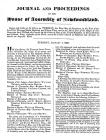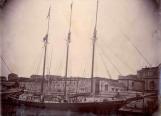1
Stained glass window in the library of the Bradley House.1955
Mockbeggar Plantation, Provincial Historic Site, Bonavista, Newfoundland
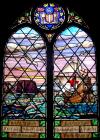
2
Confederation with Canada is not a new idea that only first appeared in the late 1940's. Newfoundland has always been a part of British North America the precurser to Confederation.In 1497 John Cabot, under commission from Henry VII, claimed all of North America for England.
From that time on the colonies that became Canada and the United States of America shared a common bond.
3
Cannon in the front yard of the Mockbeggar Plantation.1700
Mockbeggar Plantation, Provincial Historic Site, Bonavista, Newfoundland
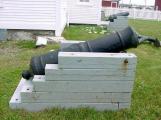
4
France too made claim to large areas of North America. The coast of Newfoundland was divided between France and England. Until the early 19th century the town of Bonavista was inside French territory even though the population was English. There was some friendly interaction between French and English fishermen, but it was war that left the most lasting impression. In the late 17th century the French, based in Placentia, launched raids on the English fishing communities on the east coast of the island. Bonavista too fell victim. The resulting terror and bloodshed left a predisposition for animosity and distrust for the French that lasted for generations. It became a factor in the campaigns for Confederation. In the 1949 campaign a popular anti-confederate song called "The Hero of ‘49" made no bones about playing on this anti-French prejudice.5
Early Map of Bonavista from the book, A History of Newfoundland, by D.W. Prowse.1740
Bonavista, Newfoundland
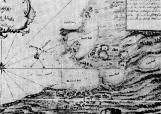
6
By the 18th century England had established an enormous fishing industry in Newfoundland. Merchants in South West England exploited the almost unlimited fish stocks. Fortunes were made and the resulting trade helped Britain to become a world power. It was a migratory fishery. Each spring ships would leave Britain and sail to Newfoundland then return to their home ports loaded with fish.7
Big Store at the Mockbeggar Plantation Provincial Historic Site.15 March 2003
Mockbeggar Plantation, Provincial Historic Site, Bonavista, Newfoundland

8
The West Country Merchants established large Rooms and Plantations to process the codfish. In the early 1700's Joseph White, a merchant from Poole became the first owner of the Mockbeggar Room, the "best room in Bonavista." The Big Store on the Mockbeggar Plantation is believed to have been built around this time. It is one of the last vestiges of the old West Country England fish trade.10
In order to protect their business interest the West Country Merchants used their wealth and political influence to retard the development of local government in Newfoundland. It wasn't until 1833 that Newfoundland achieved a representative government.In the 1830's the Mockbeggar Plantation was owned by a Poole Merchant named John Bingley Garland. Garland became the first Speaker of the House in the newly formed government. Garland was one of the last of the West Country Merchants. They were replaced by a new generation of merchants based in St. John's.
12
In 1851 James Saint of Bonavista acquired the Mockbeggar property from John H. Warren. In most Newfoundland Outports the mercantile businesses were owned by St. John's Merchants. Bonavista was different in that most of the businesses were owned by local businessmen like the Saints and Ryans. Independent of St. John's, these local merchants conducted an international trade with Europe, the West Indies and South America.13
Performers portraying Confederation supporters of the 1860's.1 July 2002
Mockbeggar Plantation, Provincial Historic Site, Bonavista, Newfoundland

